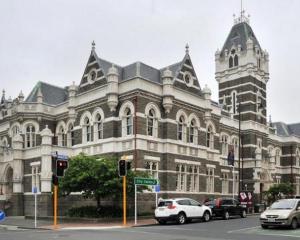
Foreign Minister Winston Peters told the United Nations General Assembly at the weekend the government had decided against recognising Palestinian statehood, retaining its "when not if" position.
Its rationale is that with Hamas in place as the de facto government of the Gaza Strip and no clarity on next steps, there is not a fully legitimate and viable State of Palestine for New Zealand to recognise.
University of Otago international relations academic Prof Robert Patman was disappointed with the lack of a firm approach.
"Given that 65,000 Palestinians have died, including 20,000 children, this sitting on the fence at a time when what was needed from New Zealand was moral clarity and legal clarity, it seems to me falls short of protecting our own interest in the rule of international law."
Prof Patman said he was not minimising the appalling terrorist atrocity by Hamas, but neither did he see — as Prime Minister Benjamin Netanyahu’s government has argued — that recognising a Palestinian state was rewarding terrorism.
"What it would do is indicate to Netanyahu that New Zealand firmly opposes Netanyahu’s plans to occupy and annex Palestinian territories."
Prof Patman said there appeared to be a "mismatch" between New Zealand’s attempt at a "nuanced" statement and what was actually happening on the ground at Gaza.
"This is not a match between equals.
"Israel is the Middle East superpower. For Hamas, we’re talking about a militia group of 20,000 fighters at best, who operate in tunnels.
"They don’t run Gaza as such."
Recognising a Palestinian State would be a first step, not a final step, Prof Patman said.
"It would be a symbolic step, but what it would do is not reward Hamas. Many Palestinians don’t like Hamas, but Hamas only developed because of the Israeli occupation."
In the 1980s, New Zealand came out strongly against apartheid in South Africa, he said.
"We didn’t lay down all sorts of conditions about what a South African state would look like after the black majority took control. We simply recognised their right for political self-determination."
Time was largely running out to take a stance, Prof Patman said.
"Benjamin Netanyahu’s view of the end game, and his far-right coalition, is full control of Gaza. These are not my words. The Israeli government announced at the end of 2024 it would go ahead with annexing the West Bank in 2025."
Meanwhile, at a special fundraising event for the Palestinian community yesterday, Palestinian-New Zealander Rinad Tamimi, of Dunedin, said she was "sad, but not surprised" by Mr Peters’ and the New Zealand government’s stance.
"What got me as a Palestinian is that Mr Peters talked about the suffering of other countries and genocide and famine happening in other countries ... but he didn’t even for a second mention the numbers of civilians killed in Gaza or the famine or the destruction that’s occurred.
"We all know that recognising Palestine is not going to change things right away in Gaza, but it is really the first step that our country could take.
"So, I’m not surprised by what he said, but it is quite shameful."
The Israel Institute of New Zealand welcomed Mr Peters’ commentary.
Director Dr David Cumin said the institute reiterated its call for the immediate release of all hostages, an end to Hamas rule in Gaza, and a return to direct negotiations between Israelis and Palestinians aimed at building a durable and just peace.
"We thank Minister Peters and the coalition government for their principled and pragmatic position."












